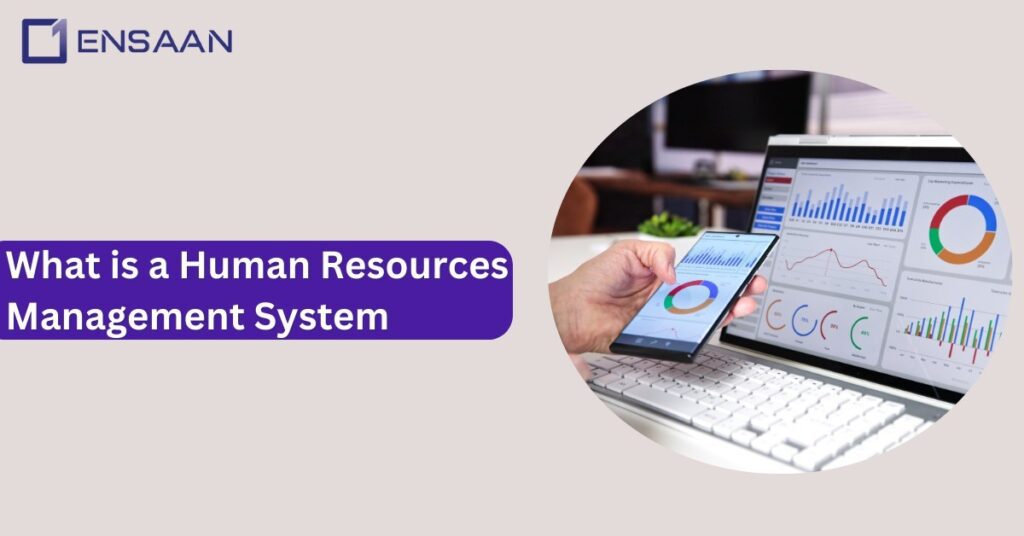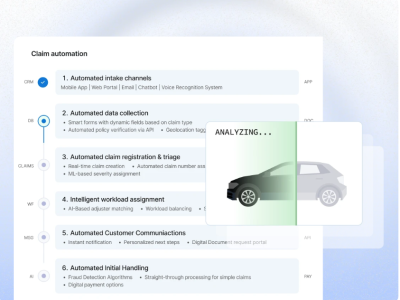Do you use a Human Resources Management System (HRMS) in your HR department?
Even if you do, you might not understand its full meaning-HRMS is an online tech tool designed to manage employees, their benefits and payroll payments as well as performance reviews, engagement surveys and more.
Knowing about HR management software (HRMS) may not be top of mind for everyone, but understanding its various forms is crucial in equipping your HR team with top-of-the-line tools that meet its needs and ensuring their needs are being met effectively.
This article will explain what an HRMS is, its advantages and benefits, key features to look out for and when is the appropriate time to upgrade or invest in a new solution.
Table of contents
- What is a Human Resource Management System?
- Functions and Objectives of an HRMS
- How does an HRMS Work?
- Why Is HRMS Important?
- Benefits of Human Resources Management System (HRMS)
- 5 Signs you should consider investing in an HRMS
- How to Choose Human Resources Management System (HRMS) ?
- What is the Difference between HRMS vs HRIS vs HCM?
- Conclusion
- FAQ
What is a Human Resource Management System?
HRMS stands for Human Resource Management System. You may also hear this term used synonymously.
An HRMS provides critical management functions, including:
- Gathering new hire paperwork
- Monitoring employee performance Running payroll
- Tracking time tracking and PTO Ensuring HR compliance with local and federal laws
- Surfacing people analytics insights
- Your HRMS’ specific functionalities will depend on which product you select.
Ensaantech provides an all-in-one HRMS experience that seamlessly unifies payroll, benefits administration, hiring, and other core HR functions onto one platform.
Instead of manually combing through spreadsheets or switching between digital tools to manage each element effectively and seamlessly manage everything with one HRMS solution from Ensaantech, all processes can be managed from just one interface.
Functions and Objectives of an HRMS
An HRMS allows human resource departments to streamline, accelerate, automate, and optimize the processes within their department.
A complete and integrated human resource management system (HRMS) must digitize every stage of an employee’s life at the company – from entry through exit for any reason.
An employee-facing HRMS allows employees to utilize this tool themselves for searching resources.
Updating profiles managing absences and payments associated with them and entering invoice payments or remuneration invoices directly without going through HR departments.
The most common modules of an HRM software are:
- Information storage (database)
- Employee self-service
- Onboarding and adaptation
- Recruitment
- Employee engagement (Surveys)
- Performance management
- Benefits administration
- Absence and leave management
- Learning and development
- Talent management
- Case management
- HR Analytics
- Payroll
How does an HRMS Work?
HRMS uses digital automation to organize and display candidate and workforce data. Security is always of utmost concern, so users require both username and password login credentials as well as two-step verification for accessing candidate and workforce records.
An HRMS also utilizes segmentation mechanisms so only authorized users have access to specific areas.
HRMSs prioritize convenience when users enter information, their changes are instantly reflected on the HR platform.
HRMS offers self-service capabilities so people can update information without depending on HR.
They also integrate seamlessly with apps offering document signing, payroll or scheduling meetings services.
Why Is HRMS Important?
HRMS is important because it helps companies build a strong work culture and reputation. It tracks everything about an employee from when they start until they leave.
This system allows companies to share important rules and safety guidelines, ensuring everyone behaves ethically and correctly.
It’s crucial for companies to invest in the right HRMS and choose a reliable provider to make sure everything runs smoothly.
1. Simplifies HR Tasks:
The HRMS simplifies and streamlines the usually time-consuming onboarding and induction, attendance tracking, leave management, and payroll processing. This frees hours of admin work for the HR staff, thus helping them pay more attention to other vital works.
2. Empower Employees:
If one wants to show respect for his people, he can give them self-service features in the HRMS; they can use it for personal information, leave requests, or training, for increasing transparency and credibility within one’s team.
3. Improved Management:
HRMS provides managers with the insights and data they need to carry out informed decisions regarding hiring, training, or supervising employees. Real-time feedback allows managers to set goals that enhance employee engagement.
4. Centralizes Employee Data:
An HRMS acts as a single source of truth for all employee records, eliminating data silos and making it easy to access critical information for compliance, payroll, and decision-making
5. Boost Productivity:
With automation of routine tasks, self-service, and insight provided by HRMS, everyone works smarter to achieve more overall productivity within their organization.
Benefits of Human Resources Management System (HRMS)
Managing human resources is a top priority for companies today because they need to attract the best talent to succeed in the market.
This is why using an HRMS (Human Resource Management System) greatly helps in achieving this goal.
1. Redirection of Efforts:
An HRMS automates repetitive tasks, freeing managers to focus on strategic tasks that are crucial for the company’s success.
2. Monitoring of KPIs:
The system helps track important business metrics like productivity, employee turnover, absenteeism, and goal achievement, providing insights into the company’s growth.
3. Task Optimization:
An HRMS collects and centralizes relevant data, automates workflows, and provides visibility into company operations through reports, tables, and graphs.
4. Enables Self-Management:
Employees can use the system to manage their own HR-related tasks, such as requesting vacations or submitting documents, reducing the workload on the HR department.
5. Protects Sensitive Data:
The system offers security features to protect company and employee data, allowing access only to authorized users. It also lets HR managers control what information each user can see and update.
6. Cost-Effectiveness:
By automating tasks and reducing manual work, an HRMS lowers costs and saves physical storage space. It also minimizes errors, reducing the time spent on corrections.
7. Recruitment Management:
The system allows you to create job postings and share them on job search sites, saving time for more critical tasks.
8. Performance Management:
An HRMS helps set and evaluate goals for employees, teams, or the entire company, tracking progress and efficiency.
9. HR Reporting and People Data:
The system generates up-to-date HR reports and analytics automatically, using the latest data from the database.
5 Signs you should consider investing in an HRMS
1. Your HR Team is Overloaded:
If your HR team is struggling to manage all the tasks, an HRMS can help automate routine jobs, saving time and improving productivity.
2. Your Employees Work in Different Locations:
Whether your team is remote or spread across multiple offices, an HRMS can centralize important information, making it accessible from anywhere.
3. You Have Trouble Keeping Up with Compliance:
If it’s hard to stay updated with legal requirements, an HRMS with built-in compliance features can help ensure your business follows the rules.
4. Your Employees Are Complaining:
If employees are frustrated with payroll mistakes or difficulty accessing their information, an HRMS can simplify these processes and reduce errors.
5. Your HR Leaders Have No Time for Planning:
If your HR leaders are too busy with administrative tasks to focus on strategy, an HRMS can automate these tasks, giving them more time to plan and improve the business.
How to Choose Human Resources Management System (HRMS) ?
When selecting an HRMS software solution for your organization, take careful note of its individual requirements. Consider these key aspects when making your selection:
- Scalability: Your platform should meet both your current needs as well as those anticipated for your organization in the future.
- Integration with Existing Systems: Avoid mismatches that force your organization either to scrap what’s working or engage in manual effort to align all systems together.
- Vendor Reliability: Read reviews and gather as much information about potential vendors before making your selection. HRMS platforms require ongoing support services; therefore, it is crucial that your chosen vendor will be responsive to your needs.
- Ease of Use: Make sure the HRMS will be intuitive for both HR teams and employees, since its benefits will only become evident if employees willingly and capable of using it.
What is the Difference between HRMS vs HRIS vs HCM?
HRMS, HRIS, and HCM all have something to do with human resources management but little bit different in what they offer:
HRIS (Human Resource Information System): A system that manages information from other HR processes, such as hiring, payroll, and benefits.
HRMS (Human Resource Management System): This is an extended version of HRIS. It encompasses a complete suite of applications that organizations can use to manage internal HR-related activities. Examples include employee information, leave management, training, and benefits.
Human Capital Management: It is a more general, older concept that is mainly based on employee experience improvement. Nowadays, it covers teamwork improvement and human resource tasks management, including workforce planning, succession planning, and compensation management.
Our analysis outlines the differences between these three related aspects of human resource management.
Conclusion
Staying on top of employee data, simplifying HR workflows-all easier goals to attain when one can rely on HRMS software. HRMS platforms fall into an umbrella that brings the best of HRIS data management and HCM strategic planning together.
With several cloud-based and on-premises services, it will be rather easy to get a custom solution towards business needs.
By streamlining all employee information into one place, automating general administrative tasks, and offering intuitive analytics.
HRMS software empowers HR operations to be further refined, enables employees, and facilitates smoother workflows, driving informed decisions.
If you see the signs that your business can benefit from an HRMS, then don’t wait for the rewards.
FAQ
An HRMS is a digital tool that helps manage employee information, payroll, benefits, and performance reviews in one place.
It automates and organizes HR tasks, stores employee data, and allows both HR staff and employees to manage information and requests easily.
It saves time, reduces errors, empowers employees, and helps ensure legal compliance, all while centralizing employee data.
The benefits of HRMS are Saves Time: Automates repetitive tasks.
Empowers Employees: Self-service features.
Improves Management: Provides useful insights.
Centralizes Data: Easy access to all information.
Boosts Productivity: Streamlines HR processes.
Consider an HRMS if your HR team is overwhelmed, employees are dispersed, compliance is challenging, or employees are facing issues with payroll.








